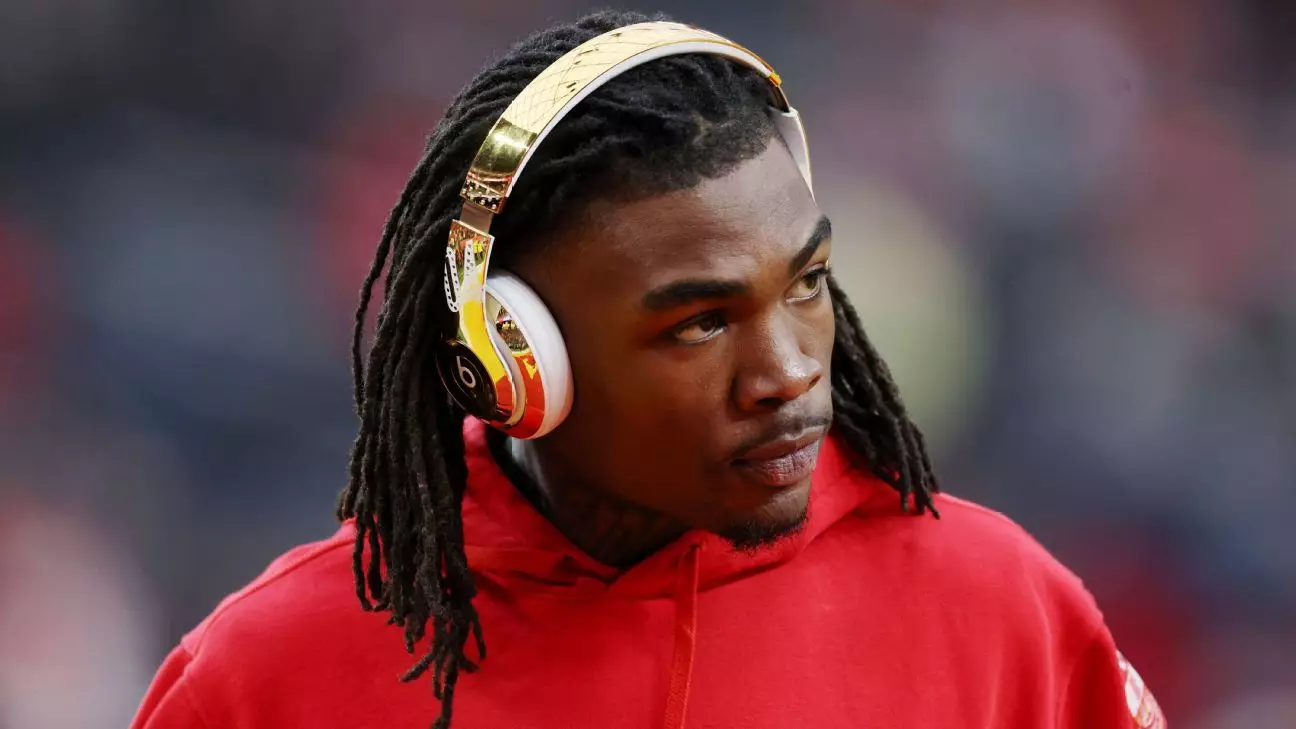In a society often mesmerized by the glitz and glamour of celebrity culture, there’s a dangerous myth that often takes root: that fame equates to immunity from consequences. Rashee Rice, a rising star for the Kansas City Chiefs, embodies this illusion. His recent legal ordeal, involving a high-speed crash, reveals a troubling gap between public admiration and accountability. While many imagine that those under the limelight are held to higher standards, the reality is that they frequently skate by, shielded by wealth, influence, and societal apathy. Rice’s case underscores how privilege can distort justice, making a mockery of the very principles that should govern societal fairness.
This incident isn’t just about reckless driving; it’s about the broader systemic tendency to overlook accountability when it involves high-profile figures. Rice’s plea bargain, deferred adjudication, and the monetary restitution paid to victims, suggest a pattern of minimal repercussions masked as “justice served.” Such leniency fosters a culture where dangerous behavior is overlooked as long as the consequences seem manageable and the personal image remains relatively intact. Society must question whether celebrity status truly warrants diminished accountability or if it perpetuates dangerous complacency.
Reckless Decisions and Their Consequences
Driving at 119 mph in a Lamborghini—an act that blatantly defies safety norms—exposes an alarming level of arrogance that some athletes, and celebrities in general, exhibit. Rice’s actions, as detailed in reports, were egregiously irresponsible, endangering not just himself but innocent lives. He claims to be “profoundly sorry,” but such apologies often ring hollow with those who understand that words are cheap when set against the potential for tragedy.
The fact that Rice was traveling at nearly double the speed limit highlights a reckless disregard for human life that cannot be excused simply because he is a professional athlete. Excessive speed is notoriously linked to fatal crashes; thus, Rice’s choice to race on a public highway with serious bodily injury as a potential outcome is not a mere case of youthful ignorance but perhaps a symptom of a larger cultural problem—where the dangerous pursuit of thrill and validation eclipses basic responsibility and empathy.
The legal consequences—jail time, probation, restitution—are indeed meaningful, but one cannot help but question whether such measures are sufficient deterrents. When someone with Rice’s platform can ostensibly delay facing lasting repercussions, it emboldens others to flout safety standards, fostering a mindset that reckless behavior is excusable or manageable if one simply pays fines or slinks back into the shadows temporarily.
The Deeper Flaws in Justice and Accountability
The systemic failures extended beyond Rice’s personal choices. The NFL’s tentative stance, awaiting further disciplinary action, illuminates a troubling pattern within professional sports: the prioritize image management over genuine accountability. Jeff Creuzot’s comments about hoping Rice “takes this as an opportunity to mature” seem more like a cautious wish than a firm stance on justice. This reflects a broader tendency to treat athletes as assets first, individuals second—an approach that perpetuates a culture of excuse-making.
This culture feeds into a dangerous narrative: that talent can outweigh ethical responsibility. When leagues sideline or minimize misconduct, it signals to fans and players alike that their status grants leniency. Such messages ultimately undermine societal efforts to promote responsible behavior and to hold even the most privileged to account. This isn’t just about Rice; it’s about the values we endorse as a society. Are we willing to let a star’s mistakes slide—especially when they could have had deadly consequences?
Furthermore, Rice’s efforts to appear remorseful don’t negate the underlying recklessness. Genuine remorse must be accompanied by meaningful change, not just statements issued after the fact. Until society, institutions, and fans demand more than superficial apologies, the cycle of privilege and impunity will continue, slowly corroding the fabric of accountability.
From Victim Impact to Societal Reflection
It’s crucial to recognize that the victims of Rice’s reckless driving are real people who endured pain, fear, and trauma. Their suffering has been somewhat overshadowed by a focus on legal technicalities and star power. This shift reveals a disturbing tendency to diminish the gravity of such incidents unless they garner widespread media attention or threaten the reputation of the accused.
This case becomes a mirror reflecting society’s broader attitudes toward privilege, responsibility, and justice. It begs us to ask: are we truly committed to fostering a culture that prioritizes public safety over spectacle? Or do we allow public figures to skate free, believing that their celebrity exempts them from the rules that govern ordinary citizens? Until we confront these uncomfortable truths, the cycle of dangerous arrogance disguised as success is bound to persist, with devastating consequences lurking just beneath the surface.
By scrutinizing Rice’s case through this lens, it’s clear that the problem runs far deeper than one athlete’s DUI; it’s a societal failure to uphold equitable standards of justice and accountability. If we truly value safety and integrity, we must demand that responsibility be non-negotiable—regardless of fame or fortune. Only then can we hope to dismantle the harmful myth of celebrity invincibility and foster a culture where accountability is universal and unwavering.


Leave a Reply